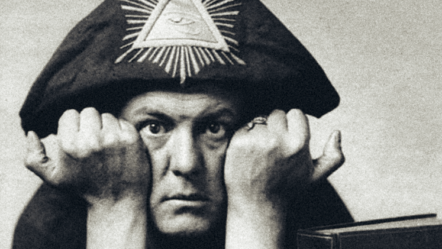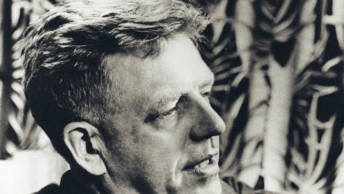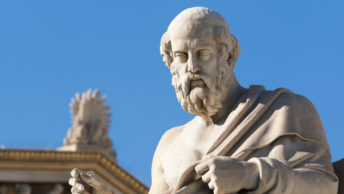If greed and material extravagance was the vice of the 19th century that of the 20th century was lust and sexual perversion. English novelist Aldous Huxley let the proverbial cat out of the bag in 1938 when he revealed that the real reason intellectuals of his generation embraced modernism was because of the unrestricted sexual freedom that it guaranteed them. Most biographers of great modernists, such as Jean-Paul Sartre, Margaret Mead, or Sigmund Freud have all but ignored their sexual proclivities.
Since the time of Luther and Descartes, the West has accepted the notion that what people do with their bodies had no effect on how they use their minds. E. Michael Jones, the editor of Culture Wars Magazine, focused on this liberal contradiction in his book, Degenerate Moderns. Sex is an appetite of unusual power, especially when it is not properly controlled. Undisciplined sexual behavior leads to compulsive habits, which is the antithesis of rational behavior. Jones conclusively established the link between the private morality and public philosophies of its liberal luminaries.
Mead’s book, Coming of Age, did much to underpin the Sexual Revolution epidemic of the sixties with her emphasis on the free love tendencies of the Samoan natives in their natural state. Jones relates how she wrote her book, partially as a justification for her promiscuous life style. Mead, who was married, was involved in two lifelong affairs—one with a man and the other with anthropologist Ruth Benedict.
Jones argues that Freud’s famous Oedipus Complex was just a rationalization for his incestuous relationship with his sister-in-law, Minna. By developing the theory that such illicit desires were universal, he projected his guilt feelings onto the world at large, avoiding self-blame for his misbehavior. This personifies the philosophy of Jean Jacques Rousseau perfectly.
All modern philosophies can be understood in light of the moral disorders of their founders, proponents, and advocates. Jones also clearly demonstrated how the intellectual’s revolt against the moral law, is in effect, a rebellion against truth itself. Jones also demonstrated, without reservation, how the twin creeds of modernity, that is, personal hedonism and social utopianism, are the products of the disordered lives of middle-class intellectuals.
The heirs to this kind of moral depravity were a trio of sexual revolutionaries, who taken as a whole, represent the radical change in moral behavior, which has plagued American culture since the dawning of the 20th century. The first one and probably one of the most degenerate human beings ever to walk the face of the earth was Aleister Crowley. He was followed, in turn by Dr. Alfred Kinsey and Hugh Hefner. Together they established a brotherhood of the flesh that has attacked the Christian faith and its followers ever since.
Crowley was called the King of Depravity and the Wickedest Man on Earth. If the idea of a Renaissance Man invokes an image of one well versed in many intellectual and moral issues of his day, then Crowley might properly be called a Depravity Man, because his entire life embodied a journey into deep human degradation and perversity. Crowley once said, to me every dirty act was simply a sacrament of sin, a passionately religious protest against Christianity, which for me was the symbol of all vileness, meanness, treachery, falsehood and oppression.
Born in England in 1875, his real name was Edward Alexander. He later changed it to Aleister, to avoid sharing the same first name as his father, who died when he was 11. As a child he was fond of torturing cats in horrible ways to see if they really had nine lives. He surrendered his virginity at age 14 to a household maid. At 17 he got his first case of gonorrhea from a prostitute.
At Cambridge Crowley studied alpine climbing, while living the life of an aristocrat. He also enjoyed as much sex as was humanly possible, showing no preference for women or men. This was in stark contrast to the behavior of his parents, who were strict fundamentalists. Crowley was a self-centered child who had also disliked his mother. He called her a brainless bigot. It was his mother who called him the Beast 666 of Revelation. He adopted the name as a form of rebellion against his early Christian formation.
Crowley had almost no capacity for natural affection. He showed great indifference toward the death of his first two children and the mental illness of his wife Rose. In his autobiography, The Confessions of Aleister Crowley, he admitted that much of his later depravity was a revolt against the moral strictures of his childhood. Crowley’s religious upbringing had equated sex with sin and since his sex life was intense and varied, he had to refute and disavow that influence. His entire life became the embodiment of this rebellion, especially with regard to sexual sins.
To him religion became the oppressor of the human soul, the blasphemer who denied the supremacy of the individual will. The only religious faith Crowley ever displayed was an antinomianism, which was the belief that Christians were freed from obeying the moral law because of grace and faith. Crowley personified the writings of the Gnostics and Rosicrucians on sexual expression. He was a pansexual, as was Alfred Kinsey. Hugh Hefner limited his sexual activities to beautiful women.
While at Trinity College at Cambridge University, Crowley met George Cecil Jones, who was a member of the Hermetic Order of the Golden Dawn, an occult society, with Rosicrucian roots. The Order’s contribution to western magical tradition is worth noting. It was their synthesis of the Kabbala, alchemy, astrology, divination, numerology, Masonic symbolism and ritual magic into one logical and coherent system that led them to influence countless future occult societies.
Crowley was initiated into the Order in 1898 and quickly rose among its ranks. He traveled extensively through Asia and the Middle East, learning and practicing Yoga and Oriental mysticism. Crowley later became involved with the Ordo Temple Orientis (O.T.O.). This group of high-ranking Freemasons had claimed to discover the supreme secret of practical magic, which was taught in its highest degrees. However, his experimental methods got him expelled from the Golden Dawn.
He later authored the Book of Law, which explained his philosophy as Do What Thou Will. This became his mantra for his entire life. The writings of Rabelais and William Blake greatly influence this book. It was his Koran and he was its chosen prophet. Crowley believed that the epoch of God and demons must get out of the way for the new era where men stopped thinking of themselves as mere creatures and stood firmly on their two feet. This became what we know today as the enlightened rationalist idea of secular humanism.
Crowley did not stop here. He took a Nietzschean leap forward to a position where man must see himself, not merely as human but as divine. The Book of Law, was his attempt to write a semi-biblical text, like Nietzsche’s Thus Sapke Zarathustra. George Bernard Shaw evoked this same idea in his play Man and Superman, written about the same time. While Nietzsche emphasized the will to power, Crowley was more interested in transcending sexual expression and the liberation of men from the dreaded restrictions of religious faith.
He had developed a philosophy that revolved around what he called sexual magic. It was the secret behind much of his thinking. In sexual magic, one had to experience the physiological phenomena in order to understand it. This constituted the true esoteric secret of the act. He had been practicing sexual magic since 1911. He described it as the art of producing phenomena at will. Crowley liked magic because he enjoyed what he believed was a direct and empowering contact with the divine. To intensify his sexual experience, he employed the sacred techniques of the ancient tantric practices, which include cosmic couplings, such as the passive emulation of Shiva and the energetic Shakti.
He practiced his sex magic with anyone he could get to join him. One such coupling included a gaggle of Russian chorus girls, called the Ragged Ragtime Girls. His sexual antics often included sadomasochism. One partner had to be beaten violently before she could be satisfied. To intensify the experience, Crowley even sharpened his canine teeth so he could inflict love bites on the wrist, and the throat with his fangs. He called this his serpent’s kiss.
Crowley usually assumed the female role in his sexual relations with other men. As part of his ritual, he sodomized Victor Neuberg in Paris in 1913, as part of a magical ceremony. Neuberg later married and settled down but remain obsessed with him for the rest of his life. Crowley had cursed him when they broke up and Neuberg attributed his life of bad health to that curse. Crowley’s The Scented Garden, was the most frank and impassioned exploration of his own sexuality. Surprisingly, critics have failed to rank it as a classic example of gay literature.
Crowley emphasized the complementary roles of the Beast and his female lovers, who were known as Scarlet Women. The way he described his actions demonstrated a blending of the Christian, Taoist, and Thelemic symbolism. Crowley was a Sun, giving Light and Life, while his mistresses were their guides in darkness, making them pure, single of heart, awake to the Highest.
Thelema, which is Greek for The Will, was the name he gave to his religious abbey, where he practiced his sexual magic. Crowley covered his walls with pictures of people having relations in every imaginable position and with demons of all kinds. He called the studio, the Chamber of Nightmares. These pornographic paintings provided Crowley with the sensual atmosphere he needed to put his conquests in the mood. His philosophy of Thelema would admit the natural propriety of homosexual relationships but it would not go so far as to champion its acceptance into the cultural mores. Those who followed would do this in the 21st century.
He was also a staunch defender of every vice known to mankind. Crowley developed his own Gnostic Mass, replete with multiple speaking parts, choreographed rituals that were to parallel and in effect ridicule the Catholic Latin rite Mass in a blasphemous manner. He carried sexual magic and traditional tantric practices even further. For him the object was not limited to a mystical union with the goddess or god, but could involve any form of concentrated inspiration or it could even manifest itself as a magical child. This could occur in any form, such as a talisman, even a human baby or a newly spiritually transformed adult man or woman. This inspiration would eventually lead to the creation of the divine self, fully released from the human soul. Crowley clearly had created his own return to Eden where men like him were gods.
When one of his students, Raoul Loveday died after some weeks of Crowley and his rituals, Italian dictator Benito Mussolini, ordered Crowley to vacate Thelema. He fled to Tunis, where he acquired a small black boy with whom he performed more acts of sexual magic. Crowley’s homosexuality, including pederasty, began as an act of open defiance of convention rather than actual preference. By this time, it seemed to be just another nasty habit.
For one who thought he was a god, Crowley could not even master his own life. He would eat and drink until he became bloated and then deliberately starve himself back to a normal weight. He never developed an interior strength and throughout the last quarter of his life he was addicted to drugs and alcohol. His body started to deteriorate from chronic bronchitis and asthma. His many sessions with mescaline, hashish, cocaine, heroin, and opium also greatly hastened his demise. He died in 1947 at the age of 72.
I doubt of a more depraved character ever walked the face of the earth. If the devil ever had an incarnate disciple, I would nominate the Beast, Aleister Crowley. While definitely in Crowley’s league of corruption, sexologist Albert Kinsey would carry the brotherhood of the flesh to a higher and more popular level.








